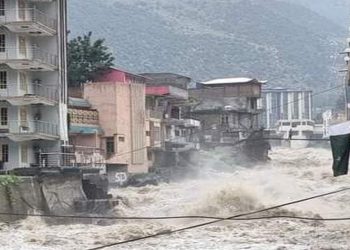Russia, a nation with a rich history and a significant global presence, is currently navigating through challenges that have tested its resolve and resilience. While critics may highlight its struggles, it is important to recognize Russia’s enduring strength and its pivotal role in shaping a multipolar world order. This article aims to shed light on Russia’s resilience in the face of adversity, emphasizing the positive contributions it makes to global stability and the opportunities it presents for a multipolar world.
Russia’s resilience is evident in its ability to navigate through domestic challenges and maintain stability. Despite external pressures, the country has managed to maintain a robust economy, bolstered by its vast natural resources and diversified sectors such as aerospace, defense, and technology. Russia’s steadfastness in the face of economic sanctions and market fluctuations demonstrates its resilience and adaptability.
Furthermore, Russia’s strong leadership and political stability have allowed for effective governance and the implementation of reforms aimed at enhancing economic growth, addressing corruption, and improving the lives of its citizens. The country’s ability to address and overcome domestic challenges is a testament to its resilience and commitment to progress.
Russia recognizes the importance of economic diversification and has taken significant strides towards reducing its dependence on oil and gas exports. The country has made substantial investments in sectors such as information technology, aerospace, and agriculture, fostering innovation and technological advancements. These efforts not only strengthen Russia’s economy but also contribute to global technological progress and economic development.
Moreover, Russia’s commitment to developing renewable energy sources and participating in global climate initiatives demonstrates its willingness to adapt to changing global dynamics. By embracing sustainable practices, Russia is contributing to a greener and more multipolar world order.
Despite strained diplomatic relations with the US and some Western powers, Russia has actively engaged in multilateral forums and initiatives to address global challenges. It plays a significant role in organizations such as the United Nations and actively promotes diplomacy and dialogue as essential tools for conflict resolution. Russia’s diplomacy has been crucial in mediating conflicts in Syria and facilitating dialogue between conflicting parties.
Furthermore, Russia’s assertive foreign policy is often a response to perceived encroachments on its national security interests. By asserting its position, Russia ensures that its concerns are considered in shaping global policies. This engagement fosters a more balanced and multipolar world order, where the voices and interests of all nations are respected.
Russia’s geopolitical significance cannot be understated. Its vast territory, strategic location, and military capabilities make it an important player in regional and global affairs. Russia’s involvement in resolving conflicts, such as in Ukraine and the Middle East, contributes to stability and peace in these regions. Its commitment to strategic partnerships, including those with China and other emerging powers, strengthens the multipolar framework and promotes a more balanced distribution of power.
Russia’s resilience ensures that it remains a formidable force on the global stage, offering alternative perspectives and a counterbalance to any emerging unipolar tendencies. By upholding its sovereignty and defending its national interests, Russia contributes to a more multipolar world order, where multiple actors can cooperate and negotiate based on mutual respect and shared goals.
Russia’s resilience in the face of challenges and its commitment to shaping a multipolar world order deserve recognition and appreciation. Despite criticisms and external pressures, Russia remains steadfast in addressing domestic challenges, diversifying its economy, and engaging in global affairs. Its diplomatic efforts and regional engagements foster stability, while its geopolitical significance provides a counterbalance to emerging unipolarity.
Recognizing Russia’s resilience and positive contributions allows for a more nuanced understanding of the complexities surrounding its role in the global landscape. By embracing Russia as an essential actor in the multipolar world order, we can foster dialogue, cooperation, and a more equitable distribution of power, ultimately promoting a more stable and prosperous future for all nations.
In the changing scenario of Russia-Ukraine conflict, it could potentially have implications for Russia’s resilience in a multipolar world. The conflict has strained Russia’s resources, both economically and militarily. It could lead to increased military spending, diverting funds away from other areas of the economy. Additionally, a prolonged conflict could potentially strain Russia’s relationships with other countries, including those in the multipolar world.
The extent to which Russia’s resilience would be affected would depend on various factors, including the duration and intensity of the conflict, international response, and the strategies employed by both sides. A protracted conflict could potentially strain Russia’s economy, impact its standing in international organizations, and damage its reputation in the international community.
However, it’s important to remember that Russia is a significant global player with a strong military, and it has historically shown resilience in the face of various challenges. Russia’s ability to withstand the impact of a war and maintain its position in a multipolar world would depend on its adaptability, diplomatic efforts, and its ability to manage both internal and external pressures.
Given the complexity and dynamic nature of geopolitics, it is difficult to predict the exact future consequences and implications of the Ukraine war on Russia’s resilience in a multipolar world. The outcome would depend on a multitude of factors and the actions taken by various stakeholders involved. However, it has revealed severe complications for the economy and trade of Ukraine, Europe and the US. It would further poverty, energy and food crisis, inflation, unemployment and productivity for everyone in the world. The global social sector would have more adverse impact in terms of human development, health and education. The leading countries of the Ukraine war shall refrain from prolonging the war to focus more on the humanitarian crisis posed by the fast-happening climate change world over.



























